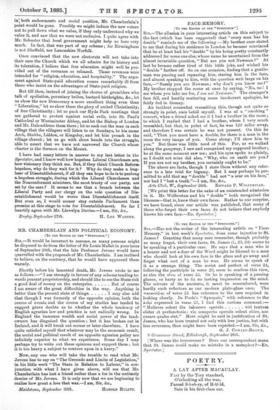rTo THE EDITOR OF TEE " SPECTATOR."] Stu,—Has not the
writer of the interesting article on " Face- Memory," in last week's Spectator, done some injustice to St. James ? Granting that many men remember, though probably as many forget, their own faces, St. James (i., 23, 24) seems to be speaking of a particular case. He says that a man who is a hearer and not a doer of the Word might be likened to a man who should look at his own face in the glass and go away and forget what sort of a man he was. He seems to speak of it as a strange thing. The aorist and perfect of verse 24, following the participle in verse 23, seem to confirm this view, as also the Zroc of verse 25. Or he is speaking of a passing glance, so hasty as to fix no lasting impression on the mind. The mirrors of the ancients, it must be remembered, were hardly such reflectors as our modern plate-glass ones. The TrapaxenPas of verse 25 has reference to the care required in looking closely. In Poole's "Synopsis," with reference to the ambpi expressed in verse 23, I find this curious comment :—
" Mulieres solent din inluerere speculo yin tantum °biter et perfunctorie ; vix conspecto specnlo solent abire, nee curare quales sint." More might be said in justification of St. James, who has been treated not only with less justice, but with less reverence, than might have been expected.—I am, Sir, &c,, G. J. COWLEY-BROWN. 9 Grosvenor Street, Edinburgh, September 28th.
[Where was the irreverence ? Does our correspondent mean that St. James could make no mistake in a metaphor P—En. Spectator.]














































 Previous page
Previous page